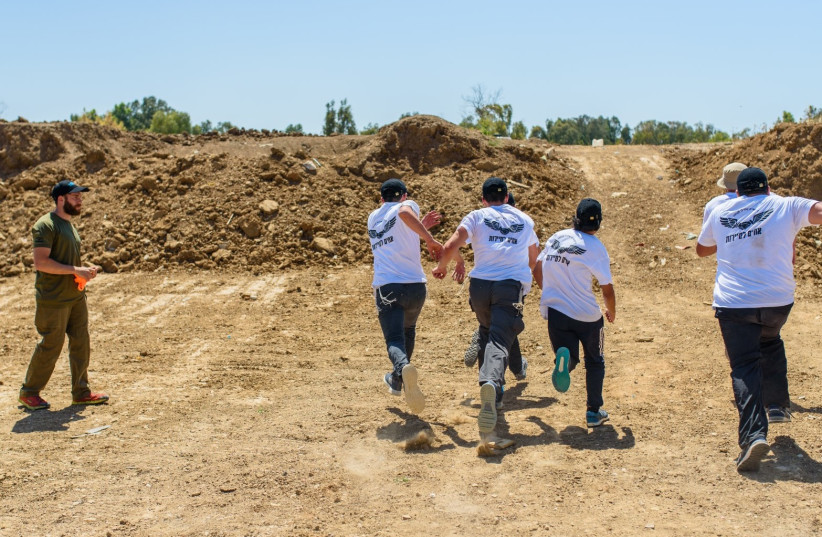A new program aiming to recruit haredi (ultra-Orthodox) soldiers into elite IDF combat units has almost doubled its participants in less than a year.
The second cycle of the program Achim Lasayarot has been underway for the past two months with 25 haredi youth from Jerusalem and the center of the country taking part.
With more haredim joining the IDF, the program was established around a year ago. It is now led by Avi Zeira, deputy CEO of Beit Yigal Alon, and Chanoch Rogozinsky, a National-Religious rabbi who has been engaged in recruiting haredi youth to the IDF.
The program is supported by the Zionist Council, the World Zionist Organization and the Keren Kayemeth LeIsrael-Jewish National Fund.
Beit Yigal Allon, on the Kinneret, has several educational programs, including those that focus on building solidarity between Arab and Jewish Israelis and better integrating Arab-Israelis into Israeli society.

With the ongoing coronavirus pandemic and following the violence that broke out in May during Operation Guardian of the Walls, “we understood that we need to focus on the Israeli part of the cake and not just the Arab,” said Zeira, who has been an educator for many years. “We have to work with the haredim.”
Working with Rogozinsky, Zeira said he was able to make a program for haredi men at an age where they are conflicted between joining the IDF or continuing to learn in yeshiva.
The first cycle of the program had 15 participants, and some have already begun the screening process for elite units such as Duvdevan, Egoz, Gadsar Nahal, Sayeret Givati and the Israel Navy.
“We want them to integrate into Israeli society, and those who have commanding personalities and a high profile can get into command positions in the military and then Israeli society,” Zeira told The Jerusalem Post.
During the program, the recruits’ study curriculum includes Zionism, democracy, and the history of the country. In addition, they go through a full combat fitness-training program that prepares them for being drafted into special units.
The aim of the program is not only to recruit them into the IDF but to have them reach senior positions in it and later in hi-tech and other avenues to integration in Israeli society.
Last August, the government approved a framework that would lower the age of haredi men exempted from military service to 21 from 24 to spur them to stop studying and enter the workforce. According to the Israel Democracy Institute, the move would “lead in the short term to the entry of about 5,000 haredim into the labor market and thousands more in the coming years.”
While the haredi population overwhelmingly opposes performing mandated national civil or military service, “in comparison to the past, we see that most families support them” in joining the military, Rogozinsky told the Post.
Rogozinsky, a Gerrer hassid, has been working for several years to integrate haredim into Israeli society. He recently has been working to get more haredi youth to enlist in the Golani and Givati brigades. “We see haredim joining the army, but not in elite units,” he said.
Joining these units “will not only provide them with a meaningful service, but it will also allow them to get higher ranks and command positions in civil society,” Rogozinsky said. But “there is no way to do that if there’s no program to help close the gap between them and secular Israelis,” he added. “Beit Yigal Alon allows them to close that gap.”
Unlike other haredi units in the IDF, such as the Netzah Yehuda Battalion (part of the Kfir Brigade), where there are only men, Rogozinsky said the men understand that they might have to serve where there are women and where it might not be as amenable to a haredi lifestyle.
“If we want to see them in senior positions, they need to be in places where Israeli society is, and they can’t always have [their wishes accommodated],” he said. “If we want to see haredim in key positions, we understand that they need to completely integrate. This is a voluntary choice; they know where they are going.”
Despite that, haredim will be able to continue to study Torah, and the program will help them throughout their service should they need anything, Rogozinsky said. “They will keep their haredi ways, and we will give them what they need,” he said.
With the majority of the participants from central Israel, the current program is taking place in Jerusalem and not at Beit Yigal Alon. Zeira and Rozoginsky plan to open up future cycles of the program in the North and South.
